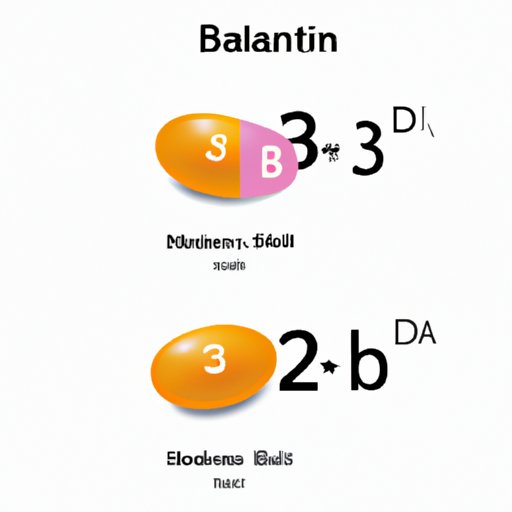
Introduction
Vitamin B3, also known as niacin, is a water-soluble vitamin that is essential for human health. This article will explore the functions and importance of vitamin B3, the benefits it provides for various aspects of health, the foods that are good sources of it, and the risks associated with vitamin B3 deficiency.
The Ultimate Guide to Vitamin B3: Its Functions and Importance
Vitamin B3 plays a vital role in many of the body’s functions, including metabolizing carbohydrates, fats, and proteins and maintaining healthy skin, nerves, and digestion. It also helps the body produce energy, and a lack of vitamin B3 can lead to fatigue, weakness, and mood changes.
Getting enough vitamin B3 in the diet is essential for maintaining good health, as a deficiency can lead to a range of health problems, including pellagra, a condition characterized by skin rashes, diarrhea, and mental confusion. Fortunately, getting enough vitamin B3 from natural sources like food is simple, and a diet rich in vitamin B3 can provide many health benefits.
7 Surprising Benefits of Vitamin B3 You Need to Know
1. Helps Lower Cholesterol Levels: Vitamin B3 can help lower LDL cholesterol levels and increase HDL cholesterol in the blood, reducing the risk of heart disease.
2. Improves Skin Health: Vitamin B3 helps reduce inflammation and redness of the skin and improve the skin’s overall texture and appearance.
3. Boosts Memory and Brain Function: Some studies have found that vitamin B3 can help boost cognitive function and improve memory by increasing blood flow to the brain.
4. Reduces the Risk of Certain Cancers: Vitamin B3, when taken in combination with other supplements, can reduce the risk of certain types of cancer, including non-melanoma skin cancer.
5. Enhances Athletic Performance: Vitamin B3 helps convert food into energy and aids in the production of red blood cells, which can improve athletic performance and endurance.
6. Helps Treat Diabetes: Vitamin B3 can help improve glucose tolerance and reduce insulin resistance in people with type 2 diabetes.
7. Promotes Healthy Eyesight: Vitamin B3 can help prevent the development of age-related macular degeneration, a condition that can lead to visual impairment.
From Niacin to NAD+: The Complex Roles of Vitamin B3 in the Body
Vitamin B3 comes in two forms, niacin and nicotinamide, both of which are converted in the body into nicotinamide adenine dinucleotide (NAD+). NAD+ is essential for many of the body’s functions, including energy production and DNA repair. Without sufficient amounts of NAD+, the body can experience a range of health problems, including chronic fatigue, neurological disorders, and metabolic diseases. Vitamin B3 also plays an important role in the activation of enzymes in the body, which is essential for energy production and other cellular processes.
What Happens When You Don’t Get Enough Vitamin B3? The Science Behind It
A vitamin B3 deficiency can lead to a range of health problems, including pellagra, a condition characterized by skin rashes, diarrhea, and mental confusion. The body requires vitamin B3 to produce energy, and a deficiency can lead to fatigue, weakness, and mood changes. In severe cases, a deficiency in vitamin B3 can lead to a condition called pellagra, which can cause skin rashes, diarrhea, and mental confusion. People at risk of vitamin B3 deficiency include those with digestive disorders, alcoholics, and people with an unbalanced diet.
How Vitamin B3 Can Improve Your Skin, Energy, and More
Vitamin B3 can benefit many aspects of health, including skin, energy, and brain function. It helps reduce inflammation and redness of the skin and improve the skin’s overall texture and appearance. Additionally, it helps convert food into energy, which can improve athletic performance and endurance. Vitamin B3 also helps improve cognitive function and memory by increasing blood flow to the brain and can help prevent the development of age-related macular degeneration, a condition that can lead to visual impairment.
The Best Food Sources of Vitamin B3 and How to Add Them to Your Diet
Vitamin B3 is found in many natural sources, including meat, fish, poultry, whole grains, and legumes. Some foods that are particularly rich in vitamin B3 include beef liver, chicken breast, peanuts, mushrooms, and brown rice. To incorporate more vitamin B3 into your diet, try adding these foods to your meals or taking a supplement.
Conclusion
Vitamin B3 is an essential nutrient that plays a vital role in many of the body’s functions, including metabolizing carbohydrates, fats, and proteins and maintaining healthy skin, nerves, and digestion. Additionally, it helps convert food into energy, improves cognitive function, and can help prevent the development of age-related macular degeneration. To prioritize getting enough vitamin B3 in your diet, try incorporating more vitamin B3-rich foods into your meals or taking a supplement.




